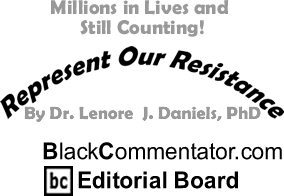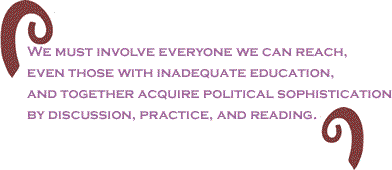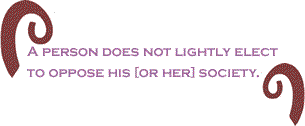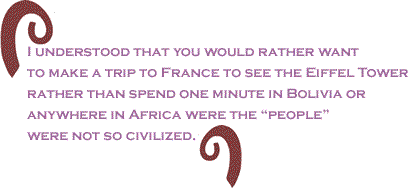
|
||||||||||||||||||||||||

|
|

Custom Search
|
|
 |
|
An arrow strikes a man in his chest. He falls backward off his horse. Then another arrow strikes another man. The men falling from their horses one by one are “men” and good men because we’ve seen their wives and little blond-haired children. These men had to save their families and these little children, girls, too, who looked like my little dolls, from these Indians. Smoke fills the air, and this high pitched yell comes from the Indians, galloping toward the men. The Indians. Barely clothe, the Indians hold arrows. Their faces are painted various colors. Their hair is strange, long or cut in strange ways. Sometimes I couldn’t watch, and I would have to put my head down between my arms, still hearing that high-pitched yell. I was supposed to be sleeping. But the television was on in the den just outside the bedroom where I lived with my grandparents. I could see the television if I lay at the foot of the bed. Sometimes, I would become so terrified of the Indians that I imagined them outside the building, just down Indiana Avenue. Only later did I understand that these images were created, fiction, and later still understand that these created images of violence were meant to teach fear. But then, I was certain there were Indians in Chicago, hiding in wait. The adults around me didn’t look like Indians. The neighbors didn’t look like Indians. Nonetheless, Indians were out there! For now, they were harassing the good people, the white people, who, like the nuns and priests, were only trying to civilize them, as they were civilizing us. The nuns and priest talked about civilizing barbarians. Barbarians, they pointed out, were in a far away place called Africa. In Africa, barbarians clung to trees and hid in the jungles. Barbarians were darker than Indians—my color, the color of other children in my school, the color of my family members and neighbors. But the nuns assured us that these African barbarians with spears were not us. Look around. We had a Church, classrooms, books, and teachers! The barbarians were the unfortunate. Catholic missionaries were in Africa, risking their lives, to try to teach the barbarians. Once a week, our school stopped classes, the nuns stood at our classroom doors, and we filed out in a single line downstairs to the cafeteria. In the dark and silence at our lunch tables, the flickering images of Catholic crusades flowed over us and filled our minds.
Catholics had a history of saving the world from barbarians in Africa and heathens, dressed in rags and relegated to the desert. These heathens couldn’t speak English. People in our neighborhood and children attending Betsy Ross public school could speak English, but, nonetheless, the nuns told us, these children were heathens as was Martin Luther King Jr., a good man, but a Baptist! Catholics had God’s representative on Earth. The Pope, children, is God’s representative. I understood that you would rather want to make a trip to France to see the Eiffel Tower rather than spend one minute in Bolivia or anywhere in Africa were the “people” were not so civilized. France was civilized. England was civilized, of course, the United States was civilized. Above all Rome, if Rome had not existed, we would not now have the benefits of our civilization! Culture is opera and brothel music is the Blues. The nuns explained that Langston’s “I, Too” referred to Negroes, living in the South, even though Langston was writing in Harlem. “Living in the South” was not too good. “Living in the South” was dangerous for Blacks. We children should be fortunate we lived in the North were there wasn’t slavery and Blacks were free to come and go. The nuns didn’t have to say “except, of course, downtown” because not one sign read, “except, of course, downtown.” But, once downtown, we had to shop at Goldblatts and Sears and not venture too much further north and we needed to do this shopping at these discount stores before sundown. Beyond downtown was a place where whites lived and had businesses for themselves. To the east of us, predominantly white students attended the University of Chicago and lived in the surrounding area of Hyde Park. To the south were whites and to the west of us was Cicero. But the nuns spoke with confidence: Blacks were safe and free in the North, in Chicago. What do we know? Remain silent. Behave and act like a young lady at all times. Listen to the teachers and study what you have been told and received a good education, unlike the heathens in our neighborhood. The white people had been kind and shared knowledge with a child among us. This was so because this was the story everyone knew. Here, at school, according to the story, is where I was to begin to transform the—Negroes—from troublesome barbarians to useful—Negroes… Occupy the mind… “A person does not lightly elect to oppose his [or her] society,” James Baldwin writes in his essay, No Name in the Street. “One would much rather be at home among one’s compatriots than be mocked and detested by them.” Recently, a fellow activist sent me a message from Martin Luther King, Jr., originally posted on the doors, June 11, 1967. In his pronouncement, King assesses the Civil Rights Movement as it stood in 1967 with particular emphasis on its weaknesses in light of the unabated resistance of white supremacy. The Civil Rights Movement, King writes, “found a method in nonviolent protest that worked [but] we did not have leisure to probe for a deeper understanding of its laws and lines of development.” The “actions” of the nonviolent movement were “bold and crowned with successes,” but they were “substantially improvised and spontaneous” and revealed “the blemishes of our inexperience” (“The Black Power Defined”).
Return to the drawing board, King suggests. Where are we experiencing our greatest weakness? Look to the people. For the people, the organizations have betrayed their interests by allowing the political power to manipulate its approach and goals. It has done so by allowing the political powers to take advantage of the “manner in which our political leaders emerge; our failure so far to achieve effective political alliances; and the Negro’s general reluctances to participate fully in political life.”
This manufactured leadership cannot bargain in good faith from a position of “genuine strength” and “independent firmness with white party leaders.” And these white party leaders, in turn, “are all too well aware” of the “impotence” and “remoteness” of these leaders from their constituents. The white leaders, King notes, deal with this leadership as it would a “powerless subordinate” class. King argues for Black mastery of the “art of political alliances” that would yield different results. Black Americans “should (my emphasis) be natural allies of many white reform and independent political groups,” but these groups “are more commonly organized by the old-line machine politicians.” We are too big to subsist on “crumbs from the big-city machines and steadfastly demand a fair share of the loaf.” We must “employ the principle of selectivity along these lines,” King writes. We must find “millions of allies who in serving themselves also support us… [on] sound foundations [of] unity and mutual trust.” While “most of us are too poor to have adequate economic power…and many of us are too rejected by the culture to be part of any tradition of power…necessity will draw us toward the power inherent in the creative uses of politics.”
“We must involve everyone we can reach, even those with inadequate education, and together acquire political sophistication by discussion, practice, and reading.” The struggle—must “become a crusade so vital that civil rights organizers do not repeatedly have to make personal calls to summon support.” Power, King concludes, “is not the white man’s birthright; it will not be legislated for us and delivered in neat government packages. It is social force any group can utilize by accumulation its elements in a planned deliberate campaign to organized it under its own control. Forty plus years down the road, and we, as Black Americans, are knee deep in the entangled web of party politics, which has meant that Black Americans, more than ever, are in league with the ruling power structure in the U.S. King and other leaders of our struggle are honored in hallow ceremonies, but few have had the courage to follow in their footsteps. Minds occupied with strategies to escalate imperialist wars for multi-national corporations under the guise of neoliberal policies are not likely to remember King’s principle of selectivity. For the most part, Black leadership/professional class has consciously decided to ally itself with the liberal wing of the imperialist rulers, the centrists, in other words, saturated with the aggressive (right-wing) strand of the virile virus of capitalism. When the Black leadership and professional elite speak, they do so then, and only then, as a collective in praise of the masters of a corporate state. Crumbs are better than nothing, you hear them say. Crumbs distinguish them, they believe, from the bums. In the meantime, to repress any grassroots mass action against racial profiling, President Barrack Obama (who claims the legacy of Martin L. King) holds a beer drinking session with Professor Henry L. Gates (who claims the legacy of the Black resistance tradition) and Cambridge Police Officer, James Crowley (who claims he is not a racist). What can a compromised Black leadership and professional class do? Nothing—but watch the show! James Baldwin returned to the U.S. in 1952 to find “nearly everyone was gracelessly scurrying for shelter… [and] friends were throwing their friends to the wolves, and justifying their treachery by learned discourses (and tremendous tomes) on the treasury of the Comintern.” In those days, he writes, communists and evil were synonymous terms. Experiencing the discourse of McCarthyism, however, taught Baldwin “something about the irresponsibility and cowardice of the liberal community” that he vowed never to forget. “Their performance,” he writes, which was more than “the combination of ignorance and arrogance with which this community has always protracted itself against the deepest implications of black suffering,” persuaded me that “brilliance without passion is nothing more than sterility.” Baldwin was then 14 years old in 1952 when he observed the “performance” of white liberals. He was scurrying around white liberals, “delivering their packages and emptying [the] garbage.” A few years later, it is Baldwin, the Black novelist, who is surrounded by the white liberals. He is the center of attention, or so it seemed. The white liberals, Baldwin states, were “proud that I had been able to crawl up to their level and been ‘accepted.’” He was an escapee from the urban cages (ghettos). He was unique, exceptional –an individual—far from the collective barbarians. He was now sitting at the table, “profoundly uncomfortable” as he apprehended he was “losing his bearings.” At the table, he writes, he “couldn’t hear anything that reflected anything which I knew or had endured, of life.” He continues, “my mother and my father, my brothers and my sisters were not present at the tables at which I sat down, and no one in the company had ever heard of them.” Baldwin could not fathom anything disturbing the sleep of those sitting at the table around him. He told himself that he would not adjust to life in New York. He could not resign himself to being “anybody’s nigger again.” The white liberals, Baldwin came to understand, fathomed themselves intellectuals, engaged in intellectual activities. But, in reality he writes, he discovers he is surrounded by “various immigrants, struggling to hold on to what they had acquired.” Intellectuals, they were not, Baldwin concluded. “Intellectual activity,” Baldwin writes, “is, and must be, disinterested—the truth is a two-edged sword—and if one is not willing to be pierced by that sword, even to the extreme of dying on it, then all of one’s intellectual activity is a masturbatory delusion and a wicked and dangerous fraud.”
Baldwin found himself, as he writes, running more away from America rather than to any particular European country. I remember this particular date in October 1995. On my way to the grocery store, I stopped at the apartment just below me and knocked at the door of an older couple. It was usual for me to check and see if this couple needed something at the store. The man had been an artist. His easel and sheets of aging charcoal sketchings occupied a corner of the living room. The husband, bed ridden for years, rarely left the apartment. Nurses came on a regular basis to check on him. The woman, frail herself, was able to get around, but it was just the two of them. If she left the apartment, her husband would be alone. The woman with long flowing white hair always came to the door. I was welcomed, on this day, as usual, to step into the living room. Both had come to know a number of Black people when they were younger. She told me what she wanted at the store and handed me the money. As I turned to leave, she asked if I had seen the television coverage of the Million Man March. Did I think a million Black men were at the march?
For a moment, I was occupied with the thought of a march of Black men that did not include Black women. But then I looked at the woman’s face and saw the immediate danger of a million Black men suddenly bursting in the door behind me. Again! Small Black towns ablaze, distorted Black bodies hanging from a tree limb, 4 little girls’ charred bodies, Malcolm’s bullet riddled body, King lying on that balcony floor, and the red faces of nuns when we did not repeat with enthusiasm the names of the martyred saints—she cannot see because a million Black men have invaded her mind. I could enter her home. As the exceptional, I was not the collective of barbarians. The woman was still standing in her space. She regained her composure and smiled as if nothing at all had happened. What do I know, anyway? A little later I returned with the item she wanted from the store and her change. More likely, this woman never understood why I, against my upbringing to respect my elders and against my desire to be neighborly, never knocked on their door again. Sixty million and counting…and it is the “and counting” that makes it difficult to compromise, particularly in this “post-racial” and most McCarthy-like era. Freedom is knowing we are linked to the Indigenous struggle in the U.S. as we are linked to Mexican and Haitian immigrants and workers; to the struggles of the people in the Honduras and to those in Gaza as well as those struggles in the Niger Delta; to the struggle against imperialism and capitalism. We are linked to those most crucial struggles around human rights, land rights, and preservation of Mother Earth, humanity, and wildlife, and those who would advocate otherwise are as criminal as those who uphold their civilization project. BlackCommentator.com Editorial Board member, Lenore Jean Daniels, PhD,
has been a writer, for over thirty years of commentary, resistance
criticism and cultural theory, and short stories with a Marxist
sensibility to the impact of cultural narrative violence and its
antithesis, resistance narratives. With entrenched dedication to
justice and equality, she has served as a coordinator of student
and community resistance projects that encourage the Black Feminist
idea of an equalitarian community and facilitator of student-teacher
communities behind the walls of academia for the last twenty years.
Dr. Daniels holds a PhD in Modern American Literatures, with a specialty
in Cultural Theory (race, gender, class narratives) from |
|
Any BlackCommentator.com article may be re-printed so long as it is re-printed in its entirety and full credit given to the author and www.BlackCommentator.com. If the re-print is on the Internet we additionally request a link back to the original piece on our Website. Your comments are always welcome. eMail re-print notice
If you send us an eMail message we may publish all or part of it, unless you tell us it is not for publication. You may also request that we withhold your name. Thank you very much for your readership. |
|
| |
|
| September
3 , 2009 Issue 340 |
|
| Executive Editor: Bill Fletcher, Jr. |
| Managing Editor: Nancy Littlefield |
| Publisher: Peter Gamble |
| Est. April 5, 2002 |
Printer Friendly Version
in resizeable plain
text format or pdf
format. |
 |

|
| |
| |












































